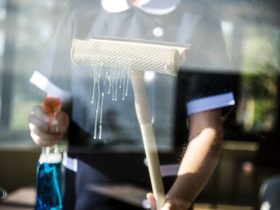Do you forget to wash and exfoliate your back? You shouldn’t, though. Furthermore, the excuse that “you can’t reach it” is insufficient justification for not doing anything. Back exfoliation and purifying foam cleanser should be a regular component of your weekly skincare routine even if you don’t think much about it until you have to wear backless clothing or a friend criticizes your acne.
The article contains a few reasons why you should include back exfoliation in your shower regimen and why not doing so could be the worst thing you ever do.
What Causes Exfoliation?
Exfoliation simply involves removing and buffing away dead skin cells to leave your skin silky smooth and velvety soft.
Every 30 days, old skin stars come out with the development of new ones. The top layers of your skin are then created by brand-new skin cells. If those dead cells don’t shed, areas may start to get dull, dry, and flaking.
Exfoliating speeds up this process by eliminating dead skin cells from the skin’s surface. You can exfoliate your skin by using a pumice stone, an exfoliating shower puff, an electric purifying foam cleanser brush, or another exfoliation equipment.
Should You Exfoliate Frequently?
For soft and clear skin, try exfoliating your skin every week. You can try it twice a month also. Moderation is critical when it comes to exfoliating; while it’s crucial to remove dead skin cells, you don’t want to remove too much of your skin’s natural oils.
You may prevent having dry, lifeless skin by following a twice-weekly exfoliation routine without removing those essential natural oils.
Both our gentle skin-exfoliating Shower Smoothies and Whipped Sugar Scrubs help remove dead skin cells and revitalize dry, dull skin.
How Do You Exfoliate Skin?
It’s important to exfoliate your skin gently. Being overly rough could produce micro rips and dry out the material. Because exfoliating scrubs and creams work best when applied to damp skin, lather up and exfoliate your skin in the morning shower or nighttime bath.
Whether using a body brush, puff, or exfoliating scrub, apply short, circular strokes to the region you wish to exfoliate. Exfoliate each area for 20 to 30 seconds before washing with warm water. After exfoliating, moisturize your body with a nutritious moisturizer to keep your skin radiant.
We advise exfoliating twice a week to guarantee that you eliminate dry, dull skin without hindering your skin’s natural oil production.
To prevent aggravating any cuts, open sores, or sunburn on your skin, refrain from exfoliating.
Here’s Why You Should Exfoliate
Exfoliation not only removes dead skin from your face and body, but it also helps with other skincare flaws and increases the efficacy of your regular skincare routine, giving you healthy, glowing skin.
Regular exfoliation offers the following main advantages
Reduce breakouts and skin blemishes
A good exfoliation program may be just what you need if you have skin that is prone to acne or other skin imperfections. Exfoliating can help unclog pores and reduce the appearance of whiteheads and blackheads if you frequently break out.
After exfoliating, if you face acne or readiness, then you will find that exfoliation was not meant for you. A moderate exfoliation routine, however, can aid in the eradication of bacteria and speed up the growth of new skin cells.
When exfoliating, exercise additional caution to avoid over-scrubbing your face or body and avoid using abrasive exfoliates. Otherwise, you risk having too-dry skin, which can lead to an overproduction of sebum, which starts the blemish cycle.
Instead, choose a gentle exfoliation, adhere to the two-day-per-week schedule, and use a light moisturizer to rehydrate your skin.
Enhance skin moisture and hydration levels you’re probably neglecting to exfoliate your skin, which means that your skin is probably also dehydrated. Your skin may find it more difficult to absorb the moisturizing moisturizers you use as layers of dead skin cells accumulate on them.
You may remove dry, flaky skin by routinely exfoliating to buff away those dead skin cells. Applying a moisturizer afterward will assist the new skin cells in better absorbing moisture and benefit from having moisturized, healthy skin.
Challenge The Aging Process Of Your Skin
As you become older, your skin will deteriorate. Your skin can get rougher, lose part of its elasticity, or develop darker pigmentation patches. Exfoliating helps you maintain your skin’s healthy radiance and smooth, silky texture as you age by reducing dry skin buildup and removing these pigmented cells. You will quickly see a change in your complexion from dry and dull to soft and bright with a daily exfoliation and moisturizing routine.
Enhance Blood Flow.
Did You Know That Skin Exfoliation Improves Blood Circulation?
- Exfoliation promotes blood flow, which helps remove impurities from the skin.
- Exfoliation helps in promoting blood flow and lymph drainage. This increased blood flow reduces the appearance of cellulite, increases skin suppleness, and enhances your overall sense of well-being.
Get Your Skin Ready for Tanning (Either Real or Fake)!
Whether you’re planning on fake tanning or soaking up the rays in the sunshine, exfoliation is a vital pre-tanning step.
Make sure you have a nice, even skin surface suited for applying fake tan by removing dead skin cells with exfoliation. While doing this, your tan may fade away with time. Similarly, exfoliating acne cleanser before tanning in the sun will help your tan last longer and seem more even by removing dry skin.
To keep your body hydrated and protected, apply a moisturizer after exfoliating and a sun-protecting moisturizer during tanning if you intend to exfoliate before tanning.
Wrapping Up
Collagen synthesis is encouraged by regular exfoliating acne cleanser , which improves the skin’s elasticity, smoothness, and youthful appearance. Dead skin cells can also prevent skincare products like sunscreen, serums, and moisturizers from entering the skin and being absorbed.














